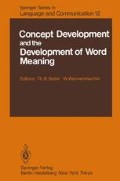Abstract
Like anyone who proposes to predict the future, with or without a crystal ball, I plan to use my knowledge of the past and present and, with minimal slight of hand, create the basis for a conceptualization of the future. My plan in the present contribution is to explicate some of my presuppositions about developmental psychology in general and cognitive development in particular. Then I will present a broad theoretical framework within which I feel comfortable in attacking the problems of the present and future. I shall conclude with some illustrations of approaches to empirical examinations of theoretical issues which I think point the way to the types of research we will find most fruitful in achieving the goals of the future paradigm of developmental psychology.
Access this chapter
Tax calculation will be finalised at checkout
Purchases are for personal use only
Preview
Unable to display preview. Download preview PDF.
References
Beck, A.T. (1976): Cognitive Therapy and Emotional Disorders (International Universities Press, New York).
Bransford, J.D., McCarrell, N.S. (1975): “A Sketch of a Cognitive Approach to Comprehension: Some Thoughts About Understanding What It Means to Comprehend”, in Cognition and the Symbolic Processes, ed. by W.B. Weimer, D.S. Palermo (Erlbaum, Hillsdale, NJ.).
Brown, A.L. (1975): “The Development of Memory: Knowing, Knowing about Knowing, and Knowing How to Know”, in Advances in Child Development and Behavior, Vol. 10, ed. by H.W. Reese (Academic, New York).
Chomsky, N. (1963): Aspects of a Theory of Syntax (MIT Press, Cambridge, MA.).
Chomsky, N. (1968): Language and Mind (Harcourt, Brace and World, New York).
Clark, E. (1972): “Some Perceptual Factors in the Acquisition of Locative Terms by Young Children”, 8th Regional Meeting, Chicago Linguistic Society.
Clark, E. (1974): Non-linguistic strategies and the acquisition of word meanings. Cognition, 2, 161–182.
Cohen, L.B., Younger, B.A. (1981): “Perceptual Categorization in the Infant”, 11th Annual Jean Piaget Symposium, Philadelphia.
Freeman, N.H., Lloyd, S.E., Sinha, C.G. (1980): Infant search tasks reveal early concepts of containment and canonical usage of objects. Cognition, 8, 243–262.
Gibson, J.J. (1960): The concept of stimulus in psychology. Am. Psychol., 15, 694–703.
Gibson, J.J. (1977): “The Theory of Affordances”, in Perceiving, Acting and Knowing, ed. by R. Shaw, J.D. Bransford (Erlbaum, Hillsdale, NJ.).
Grice, H.P. (1975): “Logic and Conversation”, in Speech Acts, Syntax and Semantics, Vol. 3, ed. by P. Cole, J.L. Morgan (Academic, New York).
Grieve, R., Hoogenraad, R., Murray, D. (1977): On the young child’s use of lexis and syntax in understanding locative instructions. Cognition, 5, 235–250.
Halliday, M.A.K. (1970): “Language Structure and Language function”, in New Horizons in Linguistics, ed. by J. Lyons (Penguin, Harmondsworth, England).
Hayek, F.A. (1969):“The Primacy of the Abstract”, in Beyond Reductionism. ed. by A. Koestler, J.R. Smythies (Macmillan, New York).
Holland, V.M., Palermo, D.S. (1975): On learning “less”: Language and cognitive development. Child Dev., 46, 437–443.
Hoogenraad, R., Grieve, R., Baldwin, P., Campbell, R.N. (1978): “Comprehension as an Interactive Process”, in Recent Advances in the Psychology of Language, Vol. 1, ed. by R.N. Campbell, P.T. Smith (Plenum, London).
Husaim, J.S., Cohen, L.B. (1981): Infant learning of ill-defined categories. Merrill-Palmer Q., 27, 443–456.
Katz, J.J. (1972): Semantic Theory (Harper & Row, New York).
Kleindorfer, G.B., Martin, J.E. (1982): “The Iron Cage, Single Vision, and Newton’s Sleep”, unpublished, The Pennsylvania State University.
Kuhn, T. (1970): The Structure of Scientific Revolutions, 2nd ed. (University of Chicago Press, Chicago, IL.).
Lewin, K. (1946): “Behavior and Development as a Function of the Total Situation”, in Manual of Child Psychology, ed. by L. Carmichael (Wiley, New York).
Lloyd, S.E., Sinha, C., Freeman, N.H. (1981): Spatial reference systems and the canonicality effect in infant search. J. Exp. Child Psychol., 32, 1–10.
Ortony, A., Schallert, D.L., Reynolds, R.E., Antos, S.J. (1978): Interpreting metaphors and idioms: Some effects of context on comprehension. J. Verb. Learn., Verb. Behav., 17, 465–477.
Palermo, D.S. (1971): Is a scientific revolution taking place in psychology? Sci. Stud., 1, 135–155.
Palermo, D.S. (1973): More about less: A study in language comprehension. J. Verb. Learn., Verb. Behav., 12, 211–221.
Palermo, D.S. (1982): “Theoretical Issues in Semantic Development”, in Language Development: Syntax and Semantics, ed. by S.A. Kuczaj (Erlbaum, Hillsdale, NJ.) pp. 335–364.
Piaget, J. (1971): Biology and Knowledge (University of Chicago Press, Chicago, IL.).
Proffitt, D.R., Halwes, T. (1982): “Categorical Perception: A Contractual Approach”, in Cognition and the Symbolic Processes, Vol. 2, ed. by W.B. Weimer, D.S. Palermo (Erlbaum, Hillsdale, NJ.).
Spence, K.W. (1956): Behavior Theory and Conditioning (Yale University Press, New Haven, CT.).
Underwood, B.J. (1963): “Stimulus Selection in Verbal Learning”, in Verbal Behavior and Learning, ed. by C.N. Cofer, B.S. Musgrave (McGraw Hill, New York).
Weimer, W.B. (1979): Notes on the Methodology of Scientific Research (Erlbaum, Hillsdale, NJ.).
Weimer, W.B., Palermo, D.S. (1973): Paradigms and normal science in psychology. Sci. Stud., 3, 211–244.
Wilcox, S., Palermo, D.S. (1975): ‘In,’ ‘on’ and ‘under’ revisited. Cognition, 3, 245–254.
Wilcox, S., Palermo, D.S. (1982): Children’s use of lexical and non-lexical information in responding to commands. J. Child Lang., 9, 139–150.
Editor information
Editors and Affiliations
Rights and permissions
Copyright information
© 1983 Springer-Verlag Berlin Heidelberg
About this chapter
Cite this chapter
Palermo, D.S. (1983). Looking to the Future: Theory and Research in Language and Cognitive Development. In: Seiler, T.B., Wannenmacher, W. (eds) Concept Development and the Development of Word Meaning. Springer Series in Language and Communication, vol 12. Springer, Berlin, Heidelberg. https://doi.org/10.1007/978-3-642-69000-6_17
Download citation
DOI: https://doi.org/10.1007/978-3-642-69000-6_17
Publisher Name: Springer, Berlin, Heidelberg
Print ISBN: 978-3-642-69002-0
Online ISBN: 978-3-642-69000-6
eBook Packages: Springer Book Archive

